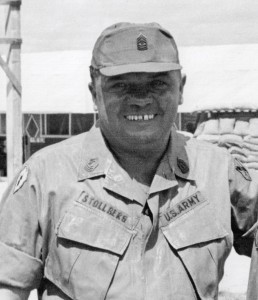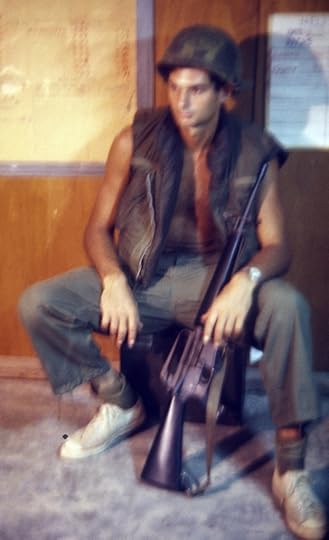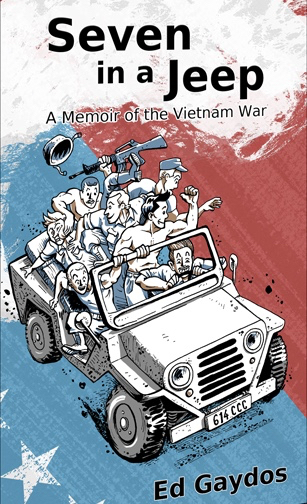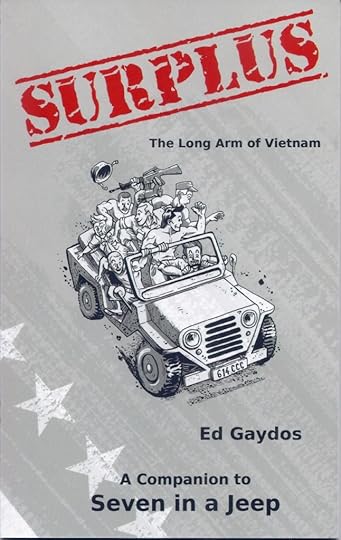Ed Gaydos – Fire Direction Control – Part One
Introduction
These stories come from my two books on Vietnam: Seven in a Jeep: A Memoir of the Vietnam War and its sequel Surplus: The Long Arm of Vietnam.
How to pick the few incidents to include here? Reading through Seven in a Jeep three years after publication I was struck by how many times First Sergeant Stollberg comes on the scene. Top and I arrived at LZ Sherry at about the same time and left within a few weeks of each other, spanning ten months together on that little patch of sand.
Most of my contribution to this history of B Battery will be stories about Top, and in this way I will tell some of my story too. Top and I didn’t get along all that well. He was Old Army to the core, a veteran of three wars; while I was a kid with a thin skin a couple years out of the Catholic seminary, and recently pulled out of graduate school. Eventually we came to a distant respect for one another, and by the time we were ready to leave LZ Sherry I came to appreciate the man behind the bluster.
I wrote home most often to my mom, to my future wife Kathleen, and to my two younger sisters Jayne and Mary Kay. God bless them these beautiful women saved every letter. These stories sometimes include quotes from those letters, in-the-moment comments from my younger self. The dialog in these stories isn’t word-for-word perfect, but comes close, because some conversations you never forget.
Top
 First Sergeant Stollberg
First Sergeant Stollberg
Picture courtesy Joe DeFrancisco
Make no mistake, First Sergeant Stollberg ran LZ Sherry. The officers played their parts, but the first sergeant pulled the strings. He had spent his adult life engaged in warfare: WWII, Korea and now a second tour in Vietnam. Top was old school artillery, and half deaf because earplugs were for pussies. He knew more about artillery than the rest of the battery combined, and had seen battles we only read about in school. Top’s combat career showed in his face. Up close it looked like tire tread. And he did not take guff from anybody.
Every morning Top called a formation. He held it at different locations around the battery, to keep the VC guessing. Placing soldiers in the same spot at the same time every day was asking for trouble. Top’s formations were quick and all business. He was keen on haircuts, upcoming inspections, work details, and the sorry state of the sad sacks under his command. Sometimes he pulled out a sheet of paper with a new policy from the Pentagon or battalion headquarters and read it word-for-word, not hiding his contempt for directives that had little to do with fighting the war.
Then there was keeping track of his boys, mostly teenagers, confined to a one-acre firebase like caged monkeys with guns. At the daily formation Top went down the rows for a report from each section chief. When he heard “All present” he looked up the rank and they had better be there.
Sometimes a section chief added, “…or accounted for.” Top would turn a red face in his direction, “So where the fuck are they? What are they doing that is so God-awful more important than my formation?”
Worst of all was, “One absent, First Sergeant.” This was shorthand for, I am missing a man and I have no idea where he is. Top’s eyes would turn to blue marbles, “You go find him right now.”
The more I got to know Top the less I liked him. He had a temper, charming one minute and shouting the next. I never knew what would set him off. From halfway across the battery I could tell what kind of a mood he was in by the shade of his face.
FO Fever
I wrote my first letter home under a flashlight three days after getting to Sherry.
May 5, 1970
I know you are all anxious to hear about LZ Sherry, the firing battery that will be my home for the next few months. Well, the food is good; much better than anything the Army ever served up in the states. But most of all I suppose you want to know how safe it is here. I’m not going to tell you it’s like being in my mother’s arms. It isn’t. We take sniper fire and of course mortar rounds every so often, just like every other firebase in Vietnam. And there is always the danger of the gooks getting thru our perimeter.
I work an “8 on – 8 off” shift around the clock, which means I spend most of my time working or sleeping. I’m still very skittery, especially at night when the VC does all its work. During our first mortar attack I just about wet my pants.
That was the night LZ Betty to our south was overrun and LZ Sherry was hit with two separate mortar attacks. The action at Sherry stopped a little after 3:00 a.m. We had no casualties that night, but LZ Betty was not so fortunate. In the morning we learned that she had taken heavy casualties, and that our forward observers there were badly hurt. An NVA infantry battalion of five companies in consort with five companies of VC, a force of about 350, had attacked LZ Betty. They killed seven U.S. soldiers and wounded thirty-five, leaving behind fourteen bodies of their own they could not carry off. That night 130 attacks occurred against firebases and installations in the region. LZ Betty was the only one to suffer a ground attack.
A forward observer team from LZ Sherry attached to 1st of the 50th Mechanized Infantry, Sergeant Pierce and radio operator Bill Wright, were at Betty when the attack occurred. Pierce took a round in the upper leg that made him fall over backwards onto Wright. The two sat back-to-back firing their weapons when Wright took two rounds, one in the back and the other in the upper leg. The last thing Wright remembers is being pulled out by a squad of the 1st/50th. When Wright woke up he was in Phan Rang and Pierce was in the next bed. (Taken from Bill Wright’s account of that night posted on the 1st Bn (Mech) 50th Infantry website: www.ichiban1.org/html/stories/story_3...)
We shot fire missions for the 1st/50th and they often bivouacked at Sherry for a day or two. I hung out with the forward observers because I loved the FO training at Ft. Sill and liked listening to stories from the field.
After only a few weeks at Sherry l had lost my jitters, grown bored and had forgotten that the FO team from Sherry had just been chewed up at LZ Betty. I wanted action and in a letter home I laid out my plan.
June 2, 1970
This FDC job is sure boring. I am thinking seriously of becoming a forward observer. Sitting between four walls for 12 hours a day and getting very little exercise is getting to me. I’d rather be out and about. We’ve got a FO here now from the field. Think I’ll talk to him in the morning. We have endless inspections, formations and “busy” projects. I’d rather have the war – seriously.
The drop in action did not last long. Fighting intensified with the beginning of monsoon season. Thick cloud cover and heavy rains reduced visibility at night to near zero and curtailed air operations, making monsoon a good time of year for the NVA and VC. They could pretty much waltz around at will. Despite a sharp increase in fighting, I still lusted for action.
July 2, 1970
Enemy activity has significantly increased with the beginning of July. This is their busy season you know. A couple VC battalions have been roaming around the area. We fired on one of them just 1000 meters off our perimeter last Sunday morning. Gunships also worked over the area. That went on all morning. Sunday morning is a favorite time with the VC. The Sunday before last I started my breakfast three times. I’d get two bites down when the siren would go off for another fire mission.
Many of the fire missions that come over our radios sound like clips from a television serial. Infantrymen taking AK-47 fire and mortars, or a chopper pilot adjusting artillery fire. Often it’s hard to believe that it’s all for real. You know I don’t even have normal dreams anymore. All I dream about are machine guns and sandbags and helicopters.
Last week we were alerted for a heli-borne operation. We were told we would be going to Bu Prang, which is on the tip of the Parrot’s Beak on the Cambodian border. But they have decided to send two guns from A Battery. I was looking forward to it; this place is so bloody boring.
 Bored and stupidly dreaming of action
Bored and stupidly dreaming of action
I applied for FO school in early August, three months after arriving in Vietnam. Every forward observer, even graduates of Ft. Sill gunnery school, needed more training in Vietnam. After my first few minutes inside FDC and after listening to the FOs on the radio call in artillery with strange protocols and even stranger terminology, I understood why. This was not something you should learn on the job. I was approved to attend FO school in October and replace a guy leaving the next month. My heart beat a little faster at the thought of getting into the action.
Just before my departure Top pulled me aside. “The captain cancelled your FO school. He thinks you’re too valuable because you have formal FDC training. And there’d be a shortage if you left.”
I was crushed, thinking only of the endless tedium before me in this little firebase. “Top, what if I talked to him?”
“Won’t do any good. He made up his mind. That’s it.”
The POW
He was a child committing an act of war. We nabbed him in our concertina wire putting rubber bands around the trip flares. The VC and NVA often sent children to disable the flares before a ground attack. This made it easier for sappers to penetrate and blow holes in the wire, leading the way for NVA and VC regulars to come pouring through. We were already on edge from a special alert that had come down a few days before, and we were taking more than the usual amount of mortar fire. Days earlier a crew servicing the trip flares in the outer wire had discovered an anti-personnel mine. It was a homemade device: explosive material and four batteries in a plastic bag, with two bamboo sticks and wires for a detonator. It did not matter to a lot of guys that the enemy disabling our flares was a kid.
The soldier who caught the boy hauled him into the compound at rifle point. He looked to be around eight years old, just a whisper of a boy. His shoulder joints stuck up from his body in two knobs. He was dressed in a pair of shorts and Ho Chi Minh sandals, made with tire treads and strips of inner tube. He was crying. A crowd gathered and soon a heated discussion boiled up.
“He’s just a little kid, let him go.”
“Bullshit, these kids are soldiers. He’s a fuckin’ prisoner as far as I’m concerned.”
“He’s faking those tears, they train ‘em to do that, and I’ll bet he’s a lot older than he looks.”
“They don’t train these kids. They threaten their families or they pay them to do this shit.”
“He did this in broad daylight, right in front of us. He’s too stupid to be a soldier.”
“He’s a soldier if he’s working for the gooks.”
Voices rose to shouting. The boy knew no English, and we could manage only a few words of Vietnamese, none of them useful. We must have seemed like white giants to him, some with yellow hair that many Vietnamese had never seen and loved to touch when given the chance. The prisoner stood surrounded by these strangely colored behemoths as they bellowed at each other in their flat, guttural language.
In came Top; he was never far away. He listened without saying a word. With no explanation Top pulled his .45 and said, “I’m gonna shoot the little fucker right here and now.” He leveled the pistol at the boy’s chest.
The crowd fell silent. The boy stopped crying. There was a moment of stillness when the unthinkable was about to occur.
“NO,” we shouted together. One soldier stepped between Top and the boy. Then all was chaos and shouting again.
Top put away his pistol, and turning to leave said, “OK, girls, but get that little shit out of my battery.”
The boy stared with wide, unseeing eyes. His entire body began to shake. The soldiers who wanted him in a POW camp now petted his shoulder, rubbed his arms, crouched to look into his eyes saying soothing words to him. The kid started to cry again. Someone brought out a Hershey bar, maybe the greatest weapon of goodwill ever deployed by the U.S. military. The boy stopped crying and looked around. He took the candy bar and gave a smile that would melt the paint off a howitzer. That was all the encouragement we needed. Guys scurried off in search of more stuff. They piled the boy high with cartons of cigarettes, candy, C rations and a magazine or two. He staggered out the main gate hardly able to carry it all, but carrying a message from Top that needed no translation.





